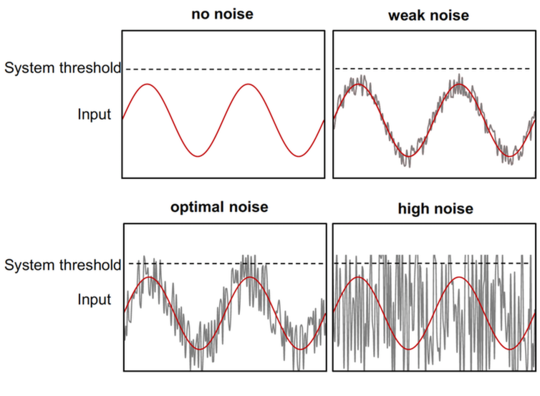 A certain optimal noise level allows people to see, hear and feel better. Shutterstock
A certain optimal noise level allows people to see, hear and feel better. Shutterstock
Like to work in a noisy environment while your colleague prefers silence? It could be your brain is simply less “noisy” so this extra, external noise improves your cognitive functioning.
Every day of our lives we effortlessly use our senses to perceive the world around us. We take in information so we can learn new things, taste our food, watch our favourite Netflix show. What we often don’t consider is that our senses are being bombarded with “noise”, and by that I mean random interference.
This interference can be noise that you hear – for example the humming of an air-conditioner in your office or listening to background music played through your headphones – or noise that you see (for example when your TV is not tuned in properly and you see some “snow” on your screen).
Such noise would usually be considered a nuisance, but evidence shows that small amounts of noise can actually be beneficial for our senses. The phenomenon is known as “stochastic resonance”.
Noise can improve performance
Stochastic-resonance was originally investigated in animals. For example, crayfish were shown to be better at avoiding predators when a small amount of random electrical currents were added to their tail fins. Paddlefish caught more plankton when small currents were added to the water.
 Paddlefish are a smooth-skinned freshwater fish. Shutterstock
Paddlefish are a smooth-skinned freshwater fish. Shutterstock
These experiments demonstrate that sensory signals can be enhanced by noise and improve behaviour in various animals. Research in humans has manipulated noise levels by making people listen to noisy sounds, look at static on a screen or by adding random vibration to the skin.
It’s been shown that as the intensity of noise is increased, a certain optimal noise level allows people to see, hear and feel better. Too much noise degrades our performance.
 Stochastic resonance occurs when an optimal level of noise is added to a weak signal. In this example the signal alone (red line) remains below the threshold for detecting the signal (dotted line). Adding an optimal amount of noise raises the stimulus periodically above the system threshold. If the added noise is too weak, the threshold is not crossed. Conversely, if the noise is too strong, the signal remains buried and cannot be discriminated from the noise. Author provided
Stochastic resonance occurs when an optimal level of noise is added to a weak signal. In this example the signal alone (red line) remains below the threshold for detecting the signal (dotted line). Adding an optimal amount of noise raises the stimulus periodically above the system threshold. If the added noise is too weak, the threshold is not crossed. Conversely, if the noise is too strong, the signal remains buried and cannot be discriminated from the noise. Author provided
This inverted-U relationship between performance and noise levels is a characteristic of stochastic-resonance. The phenomenon has real life applications. For example, adding noise to the feet of people with vibrating insoles can improve balance performance in elderly adults. It also has applications for patients with diabetes, those recovering from stroke and it may be used to augment muscle function.
Noise plays a crucial role in the brain
Human behaviour and perception occurs due to the firing of brain cells. Sometimes your brain cells fire randomly. There is more and more evidence that this random activity of your brain cells can be beneficial for your perception and cognitive performance.
My research team is interested in finding out what happens when we change noise levels in the brain directly with non-invasive brain-stimulation.
Your brain cells use electricity for their communication. In experiments conducted with my colleague Nicole Wenderoth at the Swiss Federal Institute of Technology (ETH) in Zurich, we applied currents to the brain to activate brain cells in a random fashion with transcranial random noise stimulation (tRNS). We found that when participants received stimulation, it improved how well they could see a low-quality image. This suggests that brain noise can help us see better.
In two additional experiments, conducted with Jason Mattingley and Matthew Tang at the Queensland Brain Institute, we used tRNS to provide further insight into how noise affects the brain. In one study we found that decision making can actually be improved. That is, decisions were more accurate and faster when brain cell noise levels are tuned up. Improved decision making only occurred for difficult decisions, such as when the information was ambiguous.
In a third study we found that tRNS can influence what you see during a visual illusion. This suggests that noise is important in making sure that your brain doesn’t get stuck on one way of looking at things.
In summary, our data showed that brain noise is a crucial part of human perception, decision making and being able to see from different perspectives.
How much noise you need
The optimal level of noise that can enhance cognitive functions could be different for everyone. That might explain why some people perform best in noisy environments, while others prefer silence.
There might also be a role played by brain noise in various neurological conditions. For example, it seems that individuals with autism, dyslexia, ADHD and schizophrenia have excessive brain variability compared to others.
Elderly individuals might also have more brain noise, which might be associated with a decline in cognitive performance. Small amounts of noise can improve performance, but excessive amounts degrade performance. This could explain some of the disease characteristics and cognitive and perceptual problems occurring with increasing age.
The level of brain noise can be altered with tRNS, which opens up new avenues of studying the role of brain noise on human performance. Our understanding of the role of noise in the human nervous system is expanding. This allows us to develop interventions or devices to manipulate noise levels, which could improve cognitive functioning in health and disease.
For now, if you do prefer to work in a noisy environment, you can safely make the argument that it’s likely boosting your performance.![]()
About The Author
Onno van der Groen, Research Fellow in the school of medical and health sciences, Edith Cowan University
This article is republished from The Conversation under a Creative Commons license. Read the original article.
Books on Improving Performance from Amazon's Best Sellers list
"Peak: Secrets from the New Science of Expertise"
by Anders Ericsson and Robert Pool
In this book, the authors draw on their research in the field of expertise to provide insights into how anyone can improve their performance in any area of life. The book offers practical strategies for developing skills and achieving mastery, with a focus on deliberate practice and feedback.
Click for more info or to order
"Atomic Habits: An Easy & Proven Way to Build Good Habits & Break Bad Ones"
by James Clear
This book offers practical strategies for building good habits and breaking bad ones, with a focus on small changes that can lead to big results. The book draws on scientific research and real-world examples to provide actionable advice for anyone looking to improve their habits and achieve success.
Click for more info or to order
"Mindset: The New Psychology of Success"
by Carol S. Dweck
In this book, Carol Dweck explores the concept of mindset and how it can impact our performance and success in life. The book offers insights into the difference between a fixed mindset and a growth mindset, and provides practical strategies for developing a growth mindset and achieving greater success.
Click for more info or to order
"The Power of Habit: Why We Do What We Do in Life and Business"
by Charles Duhigg
In this book, Charles Duhigg explores the science behind habit formation and how it can be used to improve our performance in all areas of life. The book offers practical strategies for developing good habits, breaking bad ones, and creating lasting change.
Click for more info or to order
"Smarter Faster Better: The Secrets of Being Productive in Life and Business"
by Charles Duhigg
In this book, Charles Duhigg explores the science of productivity and how it can be used to improve our performance in all areas of life. The book draws on real-world examples and research to provide practical advice for achieving greater productivity and success.























